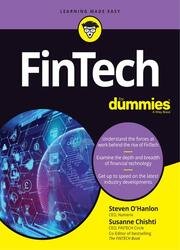FinTech For Dummies
- Добавил: literator
- Дата: 25-10-2020, 18:03
- Комментариев: 0
 Название: FinTech For Dummies
Название: FinTech For Dummies Автор: Steven O'Hanlon, Susanne Chishti
Издательство: For Dummies
Год: 2020
Страниц: 403
Язык: английский
Формат: pdf (true), epub
Размер: 15.8 MB
This comprehensive, hands-on guide is the go-to source for everything you need to confidently navigate the ever-changing scene of this booming industry. FinTech For Dummies will shed light on this rapidly changing landscape making it an invaluable source of information for anybody working in or interested in this space. This book provides insights, knowledge and guidance from industry experts Steve O’Hanlon and Susanne Chishti on the following:
Gaining insight fastest growing market segment of the financial markets
Learning the core decision making to effect a growth plan
Securing knowledge of the fastest growing fintech companies in the world
Navigating the fintech world
The ingredients into building a FinTech company
There are many definitions of FinTech, but for the purposes of this book, this one is the most relevant: FinTech companies are businesses that leverage new technology to create better financial services for both consumers and businesses. Of course, that begs another question: What is financial technology? We define it as all parts of technology that help provide financial services and products to customers. Those customers can be individuals, companies, or governments.
Blockchain is a new technology for securely storing and retrieving data in a decentralized environment. Blockchain technology is disrupting multiple industries, including finance and banking, so it’s important to understand how it works and how companies are using it. FinTech is poised to assist the banking industry with its integration of blockchain into those areas of banking that can benefit from an immutable, decentralized record system that can remove error and risk from daily operations.
Five years ago, using open source in licensed proprietary software was practically unheard of in the financial industry. It was viewed as a risky approach, and in many organizations, it clouded the question of ownership and increased the concern over security breaches and bugs. Financial institutions were wary of any software they couldn’t own or license in its entirety. Fast forward to today, and you find that the complexity of the banking industry’s needs and the need for real-time speed have driven many companies to adopt what was once considered a radical innovation. The loosening of controls around open source code has enhanced the ability of FinTech to solve problems and to replace the lumbering archaic monolithic systems that surround this industry.
Data management is the way that companies consume and protect their data. As organizations become smarter and more data-driven, data management processes must change, too. FinTech companies and all financial systems tend to process significant volumes of data that often changes continuously and rapidly. Processing data efficiently and distilling actionable insights for decision support is the major objective of many FinTech systems. The software must be able to handle input data from various formats. At minimum, these should include flat files (.csv), XML, MS SQL (Microsoft SQL Server), Oracle, and NoSQL (non-structured query language databases such as MongoDB or Hadoop). Ideally, the software should also be able to consume data using APIs.
Traditionally, organizations have stored their data in relational databases like Oracle, Db2, Microsoft SQL Server, Sybase, and PostgreSQL. However, with the advent of new database models, NoSQL databases are now becoming increasingly popular. No matter what database type you’re using, architecting a good database model is still one of the key design areas in a good data management solution.
Скачать FinTech For Dummies
Внимание
Уважаемый посетитель, Вы зашли на сайт как незарегистрированный пользователь.
Мы рекомендуем Вам зарегистрироваться либо войти на сайт под своим именем.
Уважаемый посетитель, Вы зашли на сайт как незарегистрированный пользователь.
Мы рекомендуем Вам зарегистрироваться либо войти на сайт под своим именем.
Информация
Посетители, находящиеся в группе Гости, не могут оставлять комментарии к данной публикации.
Посетители, находящиеся в группе Гости, не могут оставлять комментарии к данной публикации.
